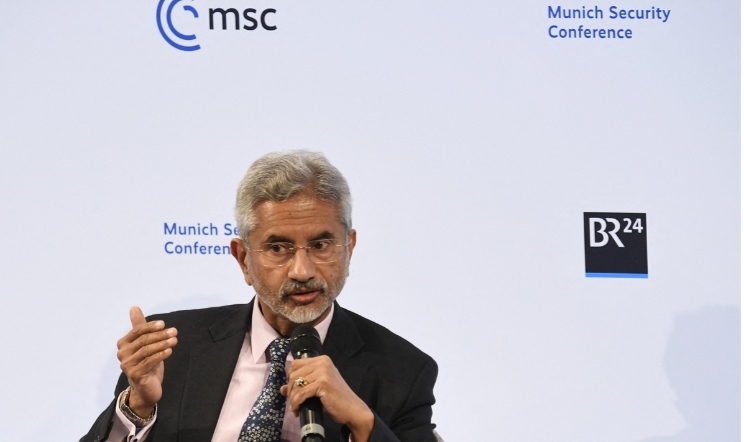Remarks By External Affairs Minister reflect India’s objections to European centralism
By Lan Jianxue

Indian Foreign Minister Subrahmanyam Jaishankar speaks on stage during the 58th Munich Security Conference (MSC) in Munich, southern Germany.
Since the outbreak of the Ukraine crisis, the West has been using China ties and Russia-related issues to pile pressure on India, hoping that New Delhi could take a tough stance against Moscow. In this context, Indian Foreign Minister S Jaishankar slammed Europe again on Friday at GLOBSEC 2022 Bratislava Forum. He said, “Somewhere Europe has to grow out of the mindset that Europe’s problems are the world’s problems but the world’s problems are not Europe’s problems.”
Jaishankar’s comments were a reflection of India’s stance on the Ukraine crisis. In the first place, India is reluctant to take sides between Russia and Europe. Instead, it wants to maintain economic and military ties with Russia while it tries not to anger Europe. However, as the US and Europe have placed increasing pressure on India, which has annoyed the Modi administration, Jaishankar used such an occasion to voice opposition to this pressure.
Second, the remarks emphasized India’s strategic autonomy, underscoring that New Delhi is a lackey of no one but seeks to be an independent major power. The comments also reflect India’s objections to Europe’s centralism, conveying that the center of the world is no longer in Europe. Meanwhile against the backdrop of the current Russia-Ukraine conflict, India’s international status has been significantly enhanced by various parties scrambling to woo India – Jaishankar’s remarks also reflect the expansion of India’s great power ambitions.
Third, Jaishankar also tried to use his comments to manage the China-India ties. Since he took office, Jaishankar has taken a relatively tough stance on China-related topics. He even tried to take advantage of international forces to pressure China in order to realize the goal of making China concede. But with the emergence of geopolitical disputes in the West, especially in Europe, India gradually realized that the US and Europe had not only failed to properly handle the geopolitical crisis, but also triggered the war. India does not want a war or a similar crisis in its neighborhood. Jaishankar’s latest statements can be seen as India’s attempt to signal its stance on China by hitting out at Europe.
Generally, India has returned to the traditional path – that is, China-India ties should be addressed through bilateral efforts without interference by a third party. The “return” has two causes. On one hand, India has seen how the war waged by the US and Europe in Ukraine does not help solve the problem and has become doubtful of US and Europe’s capabilities. On the other hand, India worries the Ukraine crisis would become a precedent, which – if similar pattern is brought by the US and Europe to South Asia – would be unbearable for New Delhi.
Since the Russia-Ukraine conflict, what India has shown diplomatically is its careful calculation of its own national interests. India wants to maintain a relatively detached position in the matter, neither offending Russia nor displeasing the US and Europe.
In recent years, the relationship between India and Russia has become less solid, and India has gradually turned to the US and Europe in a bid to contain China. India avoids condemning Russia, but the purpose behind it is to maintain its strategic independence and seek practical benefits from the chaos.
Jaishankar said India’s relationship with China is “difficult” at the moment, but India is perfectly capable of managing it. “If I get global understanding and support, obviously it is of help to me. But this idea that I do a transaction – I come in one conflict because it will help me in conflict two. That’s not how the world works,” Jaishankar said.
This is a very high-sounding speech. The purpose is to emphasize that India can handle its own relations with neighboring countries. New Delhi is unwilling to give the outside world the impression that under pressure from Europe, India will turn its back on Russia.




